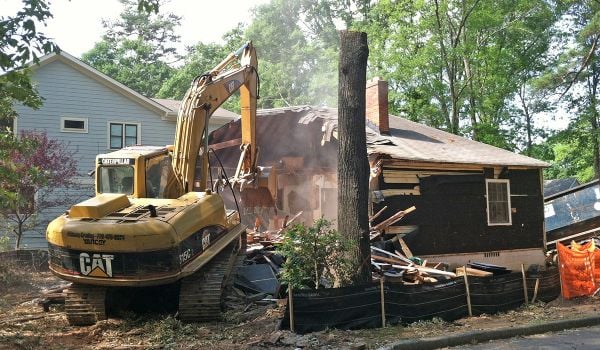Philadelphia is taking steps to protect renters from unfair evictions amid what Mayor Jim Kenney has described as a “housing crisis due to a shortage of safe and affordable housing.”
Earlier this month, City Councilman Curtis Jones Jr. introduced a bill that would require landlords to provide a “good cause” when seeking to evict tenants after a lease ends. It would also dictate that a landlord who wants to raise rent must first give an existing tenant the chance to accept the new rate. And it would give tenants the right to appeal a landlord’s “good cause” finding to the Fair Housing Commission. The proposal is modeled after other cities, like Seattle and Oakland, that have “just cause” eviction provisions on the books.
Jones says he began thinking about the proposal this year when a 239-unit apartment building in his council district changed hands, and the company that took it over notified the tenants that it would not be renewing their leases. Some of the tenants of the Penn Wynn Manor were on fixed incomes and didn’t have the time or the ability to collect enough money to pay the first and last months’ rent and a security deposit at another residence, he says. Rising rents in stable neighborhoods like the one in question made moving more challenging too.
“Some of these individuals had lived there 10, 20, 30 years and had been, in my opinion, model tenants,” Jones says.
But the tenants’ records didn’t matter; in January, everybody was told to leave. In June, occupants of the building staged a protest of the mass eviction plan in cooperation with the Philadelphia Tenants Union, which was formed by a local socialist group. The Tenants Union had already been pushing for the city to add a “just cause” provision to its books for some time before the protest was organized. They began working with Jones after the eviction case came to light.
Klyde Breitton, president of the Tenants Union, says that the bill Jones introduced fits the broad outline of what they were hoping to create. But Breitton says it would be better if it included more specific provisions, like enumerating what, specifically, constitutes a good cause for eviction. Laws in some other places do include more detail.
An ordinance in Oakland, approved by voters in a 2002 ballot measure, includes 11 specific scenarios that would qualify as just cause for eviction, including a tenant’s failure to pay rent, violation of the terms of the lease, or causing excess damage to the property, or a landlord’s wish to occupy the unit as his own primary residence or remove it from the rental market. Seattle’s ordinance includes 18 approved reasons. Seventeen are enumerated in a rule that applies across New Jersey. Los Angeles has considered expanding its just cause rule to apply beyond rent-controlled units. Some cities in California have been working to reform these exemptions to give tenants even greater protections.
There have been reports in some cities of landlords evicting tenants on the grounds that they want to move into the units themselves, but then re-listing them at higher rates. Jones’ legislation so far doesn’t contain any specific enforcement measures. (His office didn’t immediately respond to a question about whether enforcement would be considered in later drafts of the bill.)
Shamus Roller, executive director of the National Housing Law Project in San Francisco, says that cities around the U.S. are paying more attention to rental practices as a whole, and that his group has been fielding more inquiries from cities considering just cause provisions. Many places that have the rule also have some form of rent control, Roller says. And while just cause provisions are beneficial in providing some basic protections against frivolous evictions, they don’t prevent landlords from pushing tenants out by raising rents to “ridiculous levels,” Roller says. Beyond that, according to Roller, the best “just cause” laws are the ones that are most specific.
Philly’s proposal has yet to be subject to a committee hearing, where it could evolve. The proposal comes as Philadelphia is taking a wide look at rental practices and housing problems in the city. Over the summer, at the urging of City Council, the city earmarked $500,000 in additional funds to help tenants facing evictions get legal counsel. In September, Mayor Jim Kenney signed an executive order establishing an Eviction Task Force, noting that one in 14 of the city’s renters had faced an eviction filing between 2010 and 2015. The task force is charged with determining best practices in cities, helping to create a comprehensive plan for the issue, and identifying funding streams to support it. Its final recommendations are due to the mayor next June.
Jones, who represents neighborhoods in West and Northwest Philadelphia, relatively far away from Center City, says he didn’t always think of gentrification being a major problem in his district. The Penn Wynn case got him thinking about the vulnerability of some of his constituents — whether they rent or own their homes. He says he was recently walking around the district with a developer, and he asked how investors know which homeowners are likeliest to sell at low prices. The developer looked up and said that air-conditioning units in the second-floor windows signal that a home is not modernized, and the owner may be willing to sell for less than the house is worth.
“You have a right to be a capitalist,” Jones says. “But when you wholesale exploit people’s ignorance and poverty, then it is government’s responsibility to step up to the plate and provide protections, and that’s what I intend to do.”

Jared Brey is Next City's housing correspondent, based in Philadelphia. He is a former staff writer at Philadelphia magazine and PlanPhilly, and his work has appeared in Columbia Journalism Review, Landscape Architecture Magazine, U.S. News & World Report, Philadelphia Weekly, and other publications.
Follow Jared .(JavaScript must be enabled to view this email address)
















